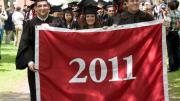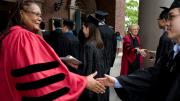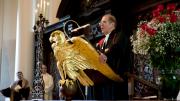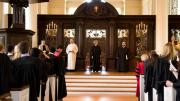The Baccalaureate ceremony is both a blessing and a farewell for the graduating class. This year, it was also a farewell of sorts to the Reverend Peter J. Gomes, late Plummer professor of Christian morals and Pusey minister in the Memorial Church, whose wit and wisdom had sent senior classes on their way for four decades prior to his death in February.
In recounting the abounding accomplishments of the class of 2011 in her May 24 Baccalaureate address, President Drew Faust emphasized the unexpected, the moments when students redefined themselves in an instant, broke with a blueprint, lived beyond expectations.
She emphasized the class’s service to others—from teaching about HIV/AIDS at a Cape Town soccer camp to starting a clinic for malnourished children in Mali—and the role of such accomplishments in changing a person’s aspirations, from the comedy writer who returned from Guatemala a labor activist, to the social anthropologist turned poet.
“You can discover, sometimes improbably, a new version of who you are,” Faust said, citing “a wide receiver who comes off the football field” to learn that he is a Rhodes Scholar, or a dancer going into cancer research “because you find both to be what you call ‘ways of exploring new possibilities.’”
Faust presented these as examples of syncopation, what trumpeter Wynton Marsalis, who received an honorary degree in 2009, described in an April campus visit as “the masterful challenging of convention, the element of surprise that makes a punchline funny…the daring application of dexterity, jocularity, and timing to challenge the grid, the common ground, or the accepted way.”
Peter Gomes was an exemplar of this, said Faust, “a moral force in the tradition of ‘veritas’ that is not just a succession of truths, but a compass.” The self-described “Afro-Saxon” was “a Republican professor at Harvard, a gay Baptist preacher, a black Pilgrim Society president from Plymouth….Even if you never came to a Sunday service, or took his course on the history of Harvard, you could feel across campus the ripple of his singularity.”
Faust recounted with humor that, “After coming out publicly, in 1992, [Gomes] gave a commencement speech to an anxious audience at Princeton Theological Seminary, and as a man of words, he let no one finish his sentences for him. He said, 'I know that my being here today is the cause of no small consternation for some of you. After all, I am... [dramatic pause] black... and I am... [dramatic pause]... Baptist... and I am… [dramatic pause]... from Harvard!' Playful. Unapologetic. Unbounded by others’ expectations.”
As they try to figure out how to live their lives, Faust urged the seniors to figure out “How, within the possible narratives, can I most be myself?” In a “daunting” and “uncertain” world, “charting a course is hard,” she acknowledged, “but you are well-prepared—with the analytic spirit, the capacity for questioning and judgment, and habits of mind your education has given you these past four years.”













